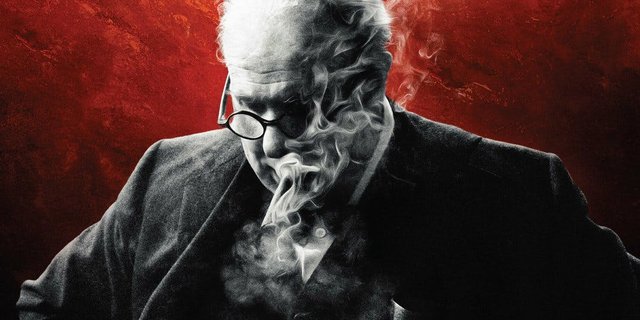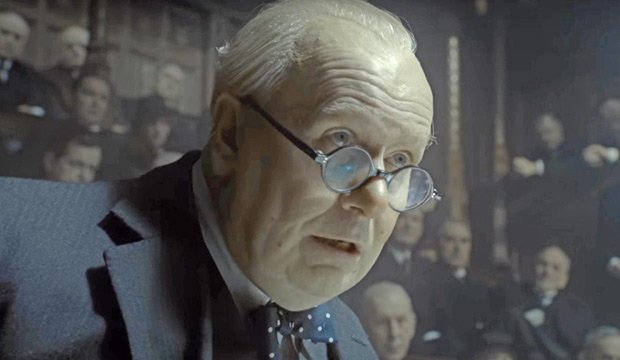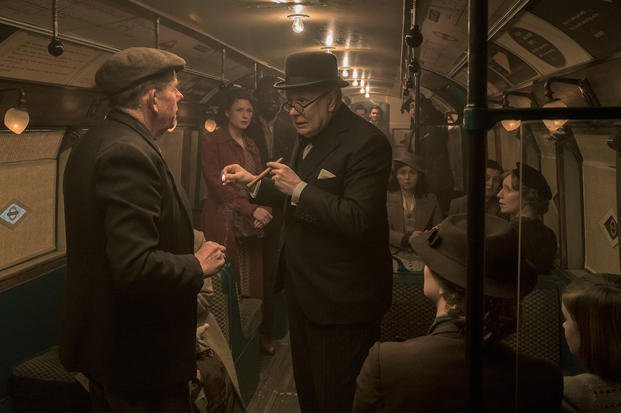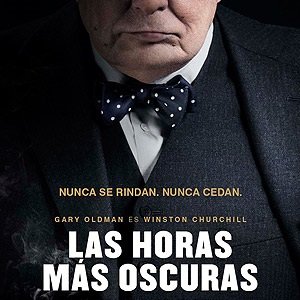The darkest and most democratic hour of England, according to Gary Oldman
If a movie is not good, if I don’t like it, if it doesn’t catch me, my body reacts: I fall asleep, I stop paying attention, I get up and go to the kitchen...
I have to see a lot of movies because of my work as a scriptwriter, but, damn! There are movies that take me up to 6 days to see, bit by bit.
That was not the case with Darkest Hour, the extraordinary film directed by Joe Wright, with a script by Anthony McCarten, which includes the first days of Winston Churchill as Prime Minister of the United Kingdom.
I did not see it in a single pull, I left it in the 8th minute because I had to leave to my office, but my body felt a tingling, and my guts shouted: "I have to go home to finish watching this movie, it's a jewel."
Now that the film is nominated for the Oscars, surely many of you have already seen it, and have read more fortunate comments than mine about cinematography, acting quality, and all those achievements that critics have unanimously praised to the film throughout the world.
I simply want to tell you about my aesthetic, intellectual, political and dramaturgical emotion, at the moment in which the scriptwriter and director turned the darkest hour of the English people into their most democratic hour, through the old Roman resource to "vox populi vox dei..."
The courtesan frictions surrounding Churchill's appointment as Prime Minister pull the story to a dead end: everyone realizes that nobody should negotiate with Hitler, that he is a monster, that he will not fulfill any agreement and will not rest until he has all of Europe, including Albion, at his feet.
But nobody does anything, nobody tells the truth: except Churchill, who warns them that there are times of blood, sweat and tears. And that is why they have to prepare for a cruel and long war, in order to achieve the peace and the survival of England.
Everybody believes in a pessimistic way (in the congress, not in the street) that the war is lost in advance. The human miseries, the petty desire to preserve a crust, a little privilege, move the members of Parliament and not the sense of history, not their duty to save their homeland.
Churchill is the only one who has that sense of transcendence. That's why he bothers them so much, that's why nobody wants him, because he tells the truth, and the truth hurts.
Even if France has surrendered, even if Russia has signed an agreement with the Nazis, although the Americans still cannot support them frontally, England will not fall, and if they fall, it will be with a handful of blood and sand in the mouth of every men and women, who will fall defending the British shores.
The worst enemy for these myopic courtiers is not Hitler, but Churchill. They do not want to save England, but defeat Churchill: they have given him the job because he is the only one capable of facing it, because he is crazy, because he drinks all day, and he lives all day quoting classics in Latin.
If it was a time of peace, if it was a time of fat cows, he would never had arrived at the number 10 of Downing Street.
He is lost, nobody wants him. Neither the king trusts Churchill and they force him to consider negotiating with Hitler through Italy, with the vague promise that something will be left of England, some leftovers that the courtiers can share, while the King will have to go into exile in Canada, and become a decorative vase.
England is going to disaster, troops are trapped in Dunkirk and all political factors want to get rid of Winston...
Who can support him?
I do not know if the story that is told in the movie is true, if he really got off the official car and went by subway to Westminter.
But if it is not, it is a sensational dramaturgical resource, because the whole film is resolved in that scene in the Metro, in which the prime minister asks for a match to light his tobacco, in which he talks with the humble workers who have fear like him, but that will defend the English soil with life if necessary, and those who give him the answer he needed, which his colleagues denied him:
"Are we going to negotiate with Hitler?"
"Never !!!"
Thus, it is the people who inspire Churchill and not the other way around. It is not the colossal leader (who was one) who raises the spirit of his people against the greatest threat that humanity has experienced in the last century: it is the simple people, on foot, who travel every day in the metro, who inspires and raises the spirit of the Prime Minister, who gives him the necessary strength to repeat angrily the same question before parliament:
"Are we going to negotiate with Hitler?"
"Never !!!"
It is a master class of script and direction: how to take the plot to a point of no return, a very high peak, a climax, which is resolved in a single sequence, simple, without special effects, using strong emotions, human fervor:
Are we going to negotiate with Hitler?"
"Never!"
Had he not gone to visit the simple people on the subway, had the petty policies of parliament been imposed and England would have fallen.
Therefore England darkest hour was also its most democratic hour, when thousands of boats went to save the troops trapped in Dunkirk, when the people told Churchill that there was no negotiation, that they would defend Albion even at the cost of their lives.
I keep that, as an invaluable memory of the film.
Gary Oldman? He’s a monster. He's my favourite to win the Oscar.
Óscar Reyes-Matute
(Samuel Ibn Motot / שמואל אבן מתת)
Darkest Hour Crew:
Director: Joe Wright
Screenplay: Anthony McCarten
Music: Dario Marianelli
Cinematography: Bruno Delbonnel
Cast: Gary Oldman, Ben Mendelsohn, Kristin Scott Thomas, Lily James, Stephen Dillane, Richard Lumsden, Philip Martin Brown, Brian Pettifer, Tom Ashley, Jordan Waller, David Olawale Ayinde, Michael Bott, Danny Stewart, John Locke
Darkest Hour trailer:



